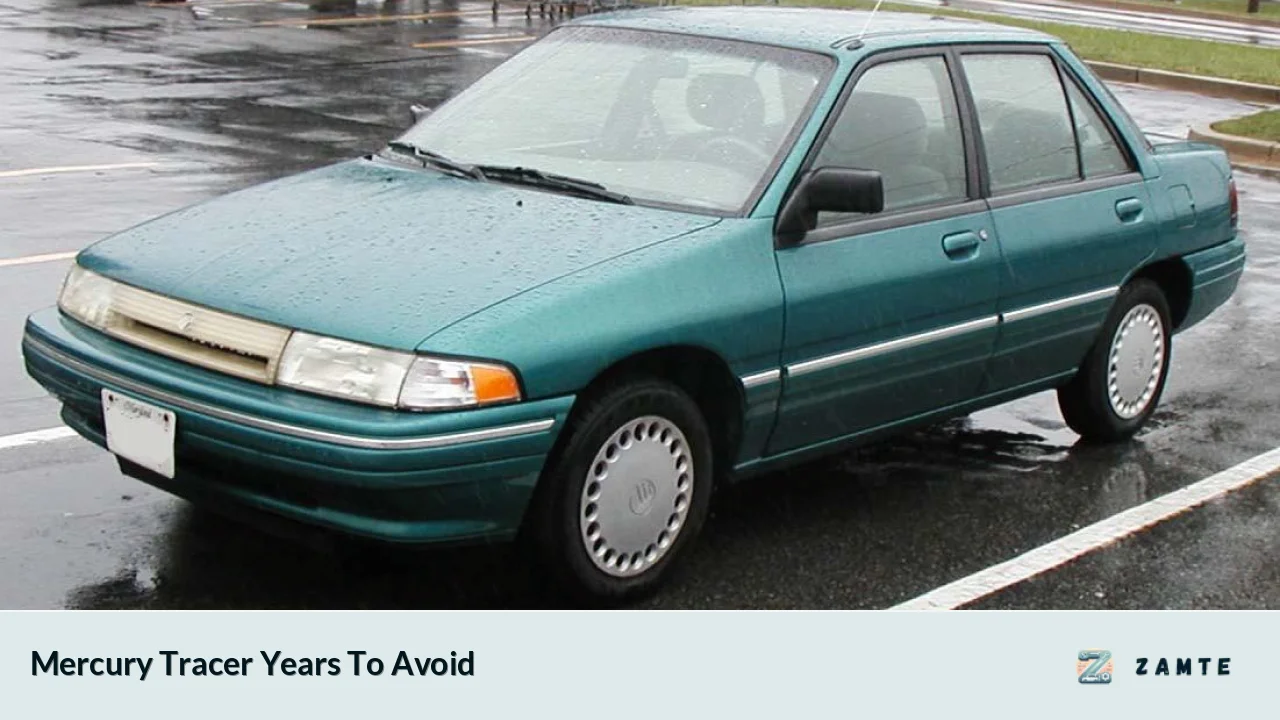The Mercury Tracer was a compact car produced by Ford Motor Company under its Mercury brand from 1987 to 1999. While it offered an affordable option for budget-conscious buyers, certain model years were plagued with reliability issues. This guide will examine the problematic years and common complaints to help used car shoppers make an informed decision.
| Year | Problem | Description |
|---|---|---|
| 1998 | Grinding/Roaring Wheel Sound | Loud noise from wheels, often requiring expensive repairs |
| 1997 | Engine/Transmission Sensor Issues | Sensors shorting out, causing performance problems |
| 1993 | Starting Problems | Vehicle fails to start, even at relatively low mileage |
| 1991-1996 | Valve Seat Issues | Valve seats falling out, causing rough running and noise |
1998 Mercury Tracer: The Worst Year
The 1998 model year stands out as particularly problematic for the Mercury Tracer. The most common and costly issue reported was a grinding or roaring sound coming from the wheels. This problem typically occurred around 104,000 miles and cost an average of $1,300 to repair[1]. The noise was often indicative of wheel bearing failure or other suspension-related problems, which could compromise vehicle safety if left unaddressed.
Additionally, some 1998 Tracer owners reported engine misfires and power loss issues. These problems could be attributed to various factors, including faulty spark plugs, ignition coils, or fuel system components. The combination of these issues makes the 1998 model year one to approach with caution when shopping for a used Mercury Tracer.
1997 Mercury Tracer: Sensor Troubles
While the 1997 model year had the highest number of overall complaints, it ranks slightly better than the 1998 model due to lower repair costs. The primary issue for 1997 Tracers involved engine and transmission sensors shorting out[1]. This problem typically manifested around 50,000 miles and cost an average of $400 to fix.
Faulty sensors can cause a variety of driveability issues, including:
- Poor fuel economy
- Rough idling
- Stalling
- Difficulty starting
These sensor problems, while less expensive to repair than the wheel issues in the 1998 model, still represent a significant inconvenience and potential safety hazard for owners.
1993 Mercury Tracer: Starting Problems
The 1993 model year Tracer experienced its share of issues, with starting problems being the most notable. Some owners reported that their vehicles wouldn't start, even at relatively low mileages around 29,000 miles[1]. This issue could be caused by various factors, including:
- Faulty starter motor
- Weak battery
- Ignition switch problems
- Fuel system issues
While the average repair cost for this problem wasn't specified in the complaints, starting issues can be frustrating and potentially leave drivers stranded.
1991-1996 Mercury Tracer: Valve Seat Concerns
A significant issue affecting multiple model years of the Mercury Tracer (1991-1996) was related to valve seats in the cylinder head. These valve seats had a tendency to fall out, resulting in rough running, excessive noise, and potential engine damage[4]. This problem could lead to:
- Loss of compression
- Reduced engine performance
- Increased fuel consumption
- Potential for more severe engine damage if not addressed promptly
The repair for this issue often involved extensive engine work, potentially including cylinder head replacement or reconditioning, which could be quite costly.
General Reliability Concerns
While specific years had their unique problems, some issues were reported across multiple model years of the Mercury Tracer. These included:
- Oil contamination in the distributor, leading to starting problems[4]
- Transmission failures, particularly in higher-mileage vehicles
- Electrical system issues, affecting various components and causing intermittent problems
It's worth noting that the Mercury Tracer shares many components with its Ford counterpart, the Escort. As such, many of the issues affecting Escorts of the same era may also apply to the Tracer.
Conclusion
When considering a used Mercury Tracer, it's crucial to be aware of the potential issues associated with each model year. The 1998 model stands out as the most problematic due to expensive wheel-related repairs, while the 1997 model suffers from sensor issues. Earlier models, particularly those from 1991-1996, may experience valve seat problems that can lead to significant engine troubles.
Prospective buyers should prioritize thorough pre-purchase inspections and carefully review maintenance records when considering a Mercury Tracer, especially for the problematic years highlighted in this guide. While some Tracers may have been well-maintained and could still provide reliable transportation, the potential for costly repairs makes careful consideration essential.
FAQs
- What is the worst year for the Mercury Tracer?
The 1998 model year is generally considered the worst due to expensive wheel-related issues and engine problems. - Are there any Mercury Tracer years that are considered reliable?
While no year is without issues, later models (post-1998) tend to have fewer reported problems, likely due to improvements and refinements. - What is the most common problem with Mercury Tracers?
Common issues include sensor failures, starting problems, and in earlier models, valve seat issues in the cylinder head. - How much do typical Mercury Tracer repairs cost?
Repair costs vary widely, from around $400 for sensor issues to $1,300 or more for major wheel or engine-related problems. - Is it worth buying a used Mercury Tracer?
Given the potential for costly repairs, especially in older models, carefully consider alternatives unless you find a well-maintained example with a thorough service history.
📌 Noteworthy reads: GMC Jimmy Years to Avoid: A Guide to Reliability Issues
